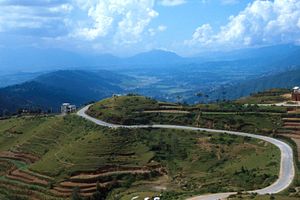As the military stand-off between India and China at the Doklam plateau shows no sign of abating, Nepal finds itself once again in the limelight. Kathmandu is being wooed by both New Delhi and Beijing though the Nepali government has made it clear that it wants a peaceful resolution of the Sino-Indian military standoff. “Nepal does not want to be dragged into the boundary dispute between India and China,” Nepali Foreign Minister Krishna Bahadur Mahara has said. He has underlined Nepal’s policy of maintaining equidistance by suggesting that “both of our big neighbors should maintain cordial relations through peaceful diplomacy and dialogue.” He was categorical that “we do not support to any of our neighbors in this case.”
But of course this is easier said than done when the stakes are as high as they seem to be in the Doklam crisis for India and China. Both sides are refusing to budge from their publicly stated positions and this is making Nepal nervous. Beijing and New Delhi have also stepped up their diplomacy to engage Kathmandu at this crucial time. The Nepali government must also be concerned by China’s attempts to bring other disputes, such as Kalapani, into the equation in order to justify its actions at the India-Bhutan-China tri-junction. Wang Wenli, deputy director general of the Boundary and Ocean Affairs of China’s Ministry of Foreign Affairs, has suggested that “The Indian side has also many tri-junctions. What if we [the Chinese] use the same excuse and enter the Kalapani region between China, India, and Nepal or even into the Kashmir region between India and Pakistan.”
Indian External Affairs Minister Sushma Swaraj was in Kathmandu last week, ostensibly to attend the Bay of Bengal Initiative for Multi-Sectoral Technical and Economic Cooperation (BIMSTEC) ministerial meeting. But her engagements with the Nepali government became the focus of her visit. Nepal has benefited tremendously from its “historic” ties with India and it seeks to further strengthen its bilateral relations with New Delhi, the Himalayan nation’s Prime Minister Sher Bahadur Deuba said even as Swaraj underlined that India attached highest priority to its relationship with Nepal. Deuba will be visiting India later this month on a five-day visit to engage with Prime Minister Narendra Modi.
Meanwhile, China is also reaching out in a big way. Chinese Vice Premier Wang Yang will be in Kathmandu this week with a big delegation to get a sense about the Deuba government’s inclinations. Beijing has pledged $8.3 billion to build roads and hydropower plants in Nepal even as Indian commitments remain in the realm of $317 million. As part of its ambitious “One Belt, One Road” initiative, Beijing is looking into the possibility of connecting Kathmandu to Lhasa in Tibet via railways at an estimated cost of $8 billion. China’s activities have been steadily expanding in Nepal after Kathmandu’s support for OBOR materialized. This happened despite India’s stiff resistance to OBOR.
The blockade along the India-Nepal border due to the Madhesi crisis had angered a large part of the Nepalese population, allowing China to step in as an alternative to India by providing not only internet access, but also alternative trade routes. Nepal’s economy has been ailing since the earthquake of 2015 as its reliance on aid and remittances remains at an all time high. China’s attraction under such circumstances is quite natural.
Deuba’s visit to India later this month will be another opportunity to bring Indo-Nepali relations on an even keel. The Modi government had started off in 2014 by investing significantly in this vital relationship, but it has struggled to revitalize bilateral ties with Nepal. Deuba’s visit will also focus on issues like the execution of the decades-old Mahakali Treaty, a memorandum of understanding on reconstruction projects in Nepal, enhancing cross-border connectivity, and expeditious completion of India-funded projects.
India’s inability to execute projects it has taken up in its neighborhood has become a big problem for its allies as well as for its own ambitions to emerge as economic guarantor in the region. It dents New Delhi’s credibility and China, by often implementing projects on time and schedule, presents itself as a more credible partner. It should therefore be no surprise that India’s smaller neighbors often seek out China’s support despite India’s discomfiture.
India’s obsession with Pakistan has also meant that policymakers in New Delhi often taken their eyes off the ball and that is China’s rapidly expanding profile in South Asia and the larger Indian Ocean region. Pakistan is a problem and has always been one, but increasingly it is a problem of managing negative externalities emerging out of Pakistan’s domestic dysfunction. Meanwhile, China’s growing role in the region means that India cannot be ad hoc and episodic in its dealings with its smaller neighbors. After all, they are India’s first line of defense against a Chinese onslaught. With Nepal in particular, India’s cultural and social connections has at times resulted in New Delhi taking the country for granted.
Nepal, like most regional states in South Asia, has tried to use to both India and China to pursue its interests. There is nothing new or controversial in this. What should be of concern to India is that despite New Delhi’s best intentions, it has been unable to assuage Nepali concerns about India’s attitudes and has not been able to implement its long-promised projects in the country. And this has resulted in China expanding its footprint in the Himalayan country. The Doklam stand-off is making this reality clear for New Delhi.
































